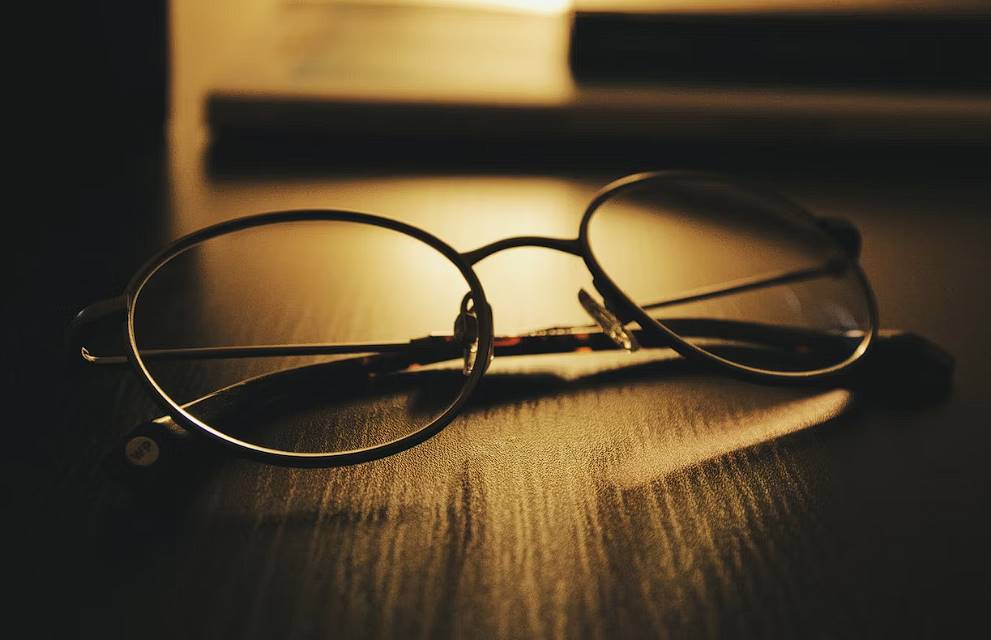Do you need help deciding between contact lenses and regular eyewear? It's a frequent situation for people who use glasses or contacts to see clearly. Finding the best answer might be challenging, as both possibilities have merits and drawbacks. What criteria should you use to pick the optimal option?
Lifestyle, convenience, comfort, and personal choice are all important considerations when deciding between contacts and glasses. Contacts are the way to go for those who lead active lifestyles or enjoy doing things outside because they provide a clear and undistorted field of vision. Glasses, on the other hand, are convenient because they don't need any upkeep and don't come into contact with the eyes. Before selecting a choice, it's important to think about these things and how they relate to your situation.
These are important considerations, but they are not the only ones. In this detailed blog post, we explore the benefits and drawbacks of both contact lenses and eyeglasses. We investigate issues such as eye health, price, current fashion, and the thoughts of eminent eye doctors.
Importance Of Contact Lens
Contact lenses have completely altered the visual correction process for those with visual impairments. Contact lenses are worn by millions of people all over the world because of their convenience and comfort. Contact lenses have improved the quality of life for many people by allowing them to see clearly and without the limitations of traditional eyeglasses.
This blog post delves into why contact lenses are so crucial, discussing their use, adaptability, and effect on the field of vision correction. Whether you're a seasoned contact lens wearer or looking at them for the first time, learning about their significance can help you make a well-informed decision. Several factors make contact lenses a viable alternative to spectacles for many people. Some benefits of wearing contact lenses include:
Natural Vision
Contact lenses, which rest directly on the eye's surface, provide a more undistorted field of view than spectacles, which can cause distortions at the edges due to their frames.
Enhanced Appearance
Instead of changing your appearance, contact lenses only enhance it. You may still show off your stunning features without worrying about them being hidden by bulky frames.
Active Lifestyle
Contact lenses are highly recommended for persons who have an active lifestyle or participate in sports. They won't slide or fall off, so you may move freely and confidently when exercising.
Perimeter Vision Free of Obstructions
When wearing contact lenses, your field of vision is not limited by glasses. This can be useful when a broader field of vision is required, such as while driving.
No Fogging Or Reflections
Unlike spectacles, contact lenses do not mist up from humidity or sweat. They make it possible to see clearly in any lighting condition by blocking out reflected light.
Compatibility With Fashion Accessories
Wearing safety goggles, sunglasses, or other eyewear is no longer an ordeal when you have contact lenses. Your eye makeup can be coordinated with the rest of your ensemble or the day's plans.
Correcting Higher Prescriptions
Contact lenses often provide more alternatives for correcting higher refractive faults than spectacles.
Importance Of Eye Glasses
Several factors make eyeglasses popular among the general public. First, because people who wear glasses tend to avoid touching their eyes, they are less likely to irritate or infect their eyes accidentally. This is especially helpful for people with sensitive or dry eyes, as glasses won't worsen things. As a bonus, eyeglasses are typically less expensive than contact lenses over time.
While contact lenses must be replaced regularly, glasses may be used for much longer, and if your prescription changes, you can replace the lenses while keeping your existing frames. In addition, glasses' frames come in a wide variety of designs, giving you an additional outlet for expressing your individuality and showcasing your sense of style. Further, glasses protect your eyes against any damage caused by wind, dust, and surrounding debris.
There are, however, a few drawbacks to using corrective lenses. One potential issue is the distortion of peripheral vision caused by glasses sitting roughly 12mm away from the eyes. This could be a problem for people whose work requires a wide field of view. Many dislike glasses because they take away from or hide their qualities aesthetically.
As a result, some people may be hesitant to choose for spectacles. It's also possible that people with high prescriptions will have their eyes look too tiny or too big because their glasses have thick, ugly lens edges. Another problem is that environmental factors impact glasses. Fogging up or precipitation accumulating on the lenses might make it difficult to see. Finally, the continual pressure that some frames provide to the nose and the area behind the ears can be a source of headaches and other pain.
Glasses or Contact Lenses: A Guided Selection
Deciding between eyeglasses or contact lenses for vision correction is a highly subjective choice. Both have their pros and cons and are adept at amending vision deficiencies. To decide between glasses and contact lenses, it's crucial to comprehend the fundamental differences between the two, enabling you to make an informed decision tailored to your lifestyle and requirements. The following comparison aims to provide insights into the two options, allowing you to select the optimal visual correction method.
Economic Considerations
In the current era, contact lenses are readily available at a reasonable cost. Technological advancements have significantly improved their efficacy, convenience, and safety. Glasses, on the other hand, can be fragile, hence contacts could serve as an appealing alternative or contingency for those on a stringent budget.
Everclear contact lenses are worth considering if you're in search of a product that harmoniously combines affordability and quality. These lenses ensure abundant oxygen supply to your eyes due to their silicone hydrogel construction and come at a modest price.
A Sporting Fit
Fed up with jamming your spectacles into a hockey face guard or motorcycle helmet? Consider the discomfort as your glasses become sweaty. Thankfully, the era of squinting and stressing your eyes while engaging in sports has come to an end. Especially in high-energy sports, contact lenses are as effective as glasses, without the discomfort.
Catering to Diverse Vision Requirements
Modern contact lenses can correct nearly every vision imperfection. Their evolution has reached a point where even severe astigmatism can be corrected. For those over 40 experiencing presbyopia-related reading issues, multifocal contacts are now an option. These contacts eliminate the need for two different glasses for near and far vision. Consult with an ophthalmologist for an expert opinion on multifocal contact lenses.
Maintenance Matters
Regular contact lens users will vouch for their utility. Contacts are more portable than glasses and aren't prone to scratches like glasses are over time, reducing the chance of vision blurring.
However, caring for contact lenses is paramount for an optimal wearing experience. They need regular cleaning and periodic replacements. It's advisable to remove and disinfect the lenses nightly to clear any protein deposits, ensuring comfort and hygiene. Adhere to your optometrist's directions on lens replacement, be it monthly, bi-weekly, or even daily. It's crucial not to reuse or clean daily disposable contact lenses. The convenience of not worrying about lens cleaning or protein and bacterial build-up makes daily disposables the healthiest choice.
An Instantaneous Style Transformation
Add a splash of colour to your day and express your personality with coloured contact lenses. For those with single-vision prescriptions keen on experimenting with their eye colour, coloured contacts are an excellent choice. It's advisable to have coloured contacts fitted by a specialist, regardless of whether you need corrective lenses.
Experiment with soft, earthy shades or go for something vibrant and bold. A fitting session also allows you to try different colours that complement your features best.
Discard Prescription Sunglasses
With contact lenses, you no longer need to juggle between your regular glasses and prescription sunglasses. A single pair of sunglasses is all you need. Additionally, many contact lens brands now offer UV protection.
However, UV-blocking contact lenses are not designed to replace sunglasses as they don't provide complete protection against UV radiation, nor cover the entire eye and the surrounding delicate tissue. Sunglasses with UV protection still remain essential for maximum protection and style.
Comfort for Your Eyes
Once you get the hang of inserting and removing your contact lenses, you can fully appreciate their convenience. Consult your optometrist to identify the best contact lens type for you, be it soft contacts or RGP (Rigid Gas Permeable) lenses.
Comfort in the Workplace
Workplace conditions like dry air or air conditioning can make wearing contact lenses uncomfortable. There are specifically designed lenses to counter the strain on your eyes during prolonged working hours. Always keep eye drops handy if you wear contact lenses.
Remember to regularly rest your eyes if you work on a computer screen. Adhere to the 20-20-20 rule: every 20 minutes, take a 20-second break to look at something at least 20 feet away. Your retinas will thank you.
Discreet Vision Correction
Contact lenses provide a more subtle vision correction solution compared to glasses. This is particularly beneficial for those with strong prescriptions who want to avoid wearing thick lenses. Contacts, even with high prescriptions, are less noticeable than glasses and eliminate any distortion or curvatures that might occur with high-prescription glasses.
Unhindered Peripheral Vision
With contact lenses, there's no need to worry about glasses obstructing your side vision. You can enjoy a wide, unobstructed field of view, providing you with a complete perspective. When correctly used, contact lenses significantly enhance your peripheral vision.
Conclusion
Lifestyle, convenience, comfort, and personal preference are crucial factors to think about when picking between contact lenses and normal eyewear. Those who lead busy lifestyles or participate in outdoor activities may benefit from wearing contact lenses since they allow for a more natural and unobstructed field of vision. They work well for activities that require a wider field of view, including driving.
The general population favours eyeglasses because they are practical, practical, and fashionable. They last longer than contact lenses and cost less money overall. However, there are disadvantages to using corrective lenses, including environmental influences, persistent pressure on the nose and ears, and distortion of peripheral vision.
When deciding between glasses and contact lenses, it is important to think about the cost. For individuals on a tight budget, contact lenses offer a more practical and cost-effective option than glasses. If you want a contact lens brand that doesn't break the bank but still delivers excellent results, consider Everclear. They offer a great fit with little pain, so you may wear them while playing sports.
Contact lenses today can correct even the most severe cases of astigmatism. Multifocal contacts can help those over the age of 40 who have trouble reading due to presbyopia. Their portability and resistance to scratches make them a convenient option for people who wear contact lenses regularly. However, a top-notch wearing experience hinges on regular servicing. It's important to follow your optometrist's instructions for cleaning and replacing your lenses on a regular basis.
Contact lenses are a fun and easy way to change your look and make a statement. They offer protection from the sun's rays and negate the need for corrective lenses in regular sunglasses. Contact lenses make wearing glasses or contacts more bearable, especially for lengthy periods of time. They're comfortable, easy to use, and unobtrusive; all you need are eyedrops or some downtime. Contact lenses are a more discreet alternative to glasses for people who need significant correction. When used properly, they also increase peripheral vision thanks to the large, unobstructed field of view they offer.
Content Summary
- Deciding between contact lenses and glasses requires considering lifestyle, convenience, comfort, and personal choice.
- Contact lenses offer a clear and undistorted field of vision, making them suitable for active lifestyles and outdoor activities.
- Glasses require no upkeep and don't come into contact with the eyes, providing convenience.
- Factors such as eye health, price, current fashion, and expert opinions should be considered when making a decision.
- Contact lenses have improved the quality of life for many people with visual impairments.
- Contact lenses provide natural vision without distortions at the edges caused by glasses frames.
- Contact lenses enhance appearance without hiding facial features like bulky frames can.
- Contact lenses are recommended for those with active lifestyles and sports participation as they don't slide or fall off.
- Contact lenses offer a broader field of vision, beneficial while driving or when a wider range is required.
- Contact lenses do not fog up or reflect light, allowing clear vision in various lighting conditions.
- Contact lenses can be worn with fashion accessories and coordinated with outfits.
- Contact lenses provide more options for correcting higher refractive faults than glasses.
- Eyeglasses are less likely to irritate or infect eyes, making them suitable for people with sensitive or dry eyes.
- Eyeglasses are generally less expensive than contact lenses in the long run.
- Glasses can be used for a longer time, and lenses can be replaced when prescription changes while keeping existing frames.
- Glasses offer a wide variety of designs, allowing expression of individuality and style.
- Glasses protect eyes from wind, dust, and debris, preventing damage.
- Glasses sitting away from the eyes may cause peripheral vision distortion, which can be problematic for certain professions.
- Glasses may affect aesthetics and hide facial qualities, which some individuals may not prefer.
- High prescriptions can result in thick lens edges, making eyes appear too small or too big.
- Glasses can be impacted by environmental factors like fogging or precipitation, affecting visibility.
- Frames can exert pressure on the nose and behind the ears, leading to headaches and discomfort.
- Deciding between glasses and contact lenses is subjective, considering personal preferences and lifestyle.
- Contacts lenses are now more affordable, convenient, and safe due to technological advancements.
- Fragile glasses make contact lenses an appealing alternative for those on a budget.
- Contact lenses are comfortable and suitable for high-energy sports without discomfort.
- Modern contact lenses can correct nearly every vision imperfection, including severe astigmatism and presbyopia.
- Multifocal contacts eliminate the need for separate glasses for near and far vision.
- Proper maintenance of contact lenses ensures clear vision and reduces the chance of blurring.
- Daily disposables offer the convenience of not worrying about lens cleaning or protein build-up.
- Coloured contact lenses allow for a style transformation and personal expression.
- Fitting coloured contacts by a specialist ensures the best results.
- Contact lenses eliminate the need for prescription sunglasses, as they can be worn with regular sunglasses.
- UV-blocking contact lenses provide additional protection, but sunglasses are still necessary for complete coverage.
- Once accustomed to wearing contact lenses, they provide comfort and convenience.
- Special lenses are available to counter eye strain during prolonged work hours in dry or air-conditioned environments.
- Resting the eyes regularly and following the 20-20-20 rule is important for contact lens wearers working on computers.
- Contact lenses offer discreet vision correction, especially for those with strong prescriptions.
- Contacts provide unhindered peripheral vision, allowing a wide, unobstructed field of view.
- Properly used, contact lenses significantly enhance peripheral vision.
- Economic considerations should be taken into account when choosing between glasses and contact lenses.
- Technological advancements have made contact lenses more affordable and effective.
- Everclear contact lenses offer affordability, quality, and abundant oxygen supply to the eyes.
- Contact lenses are suitable for sports, providing comfort and effectiveness without the need for glasses.
- Contact lenses can correct various vision imperfections, including severe astigmatism and presbyopia.
- Regular maintenance is essential for contact lenses, including cleaning and periodic replacements.
- Daily disposable contact lenses offer the healthiest choice and convenience.
- Coloured contact lenses allow for experimenting with eye colour and can be fitted by specialists.
- Contact lenses eliminate the need for juggling between regular glasses and prescription sunglasses.
- Contact lenses provide comfort, subtle vision correction, and an unobstructed field of view for an optimal visual experience.
Frequently Asked Questions
While contact lenses are generally safe, they may not be suitable for everyone. Certain eye conditions, such as severe dry eyes or corneal abnormalities, may make it challenging to wear contact lenses comfortably. Additionally, some individuals may have allergies or sensitivities to contact lens materials or cleaning solutions. It is crucial to consult with an eye care professional to assess your eye health and determine if contact lenses are a safe option for you.
The cost-effectiveness of contact lenses versus glasses depends on several factors, including the type of lenses or glasses you choose, your prescription, and your eye care needs. In general, glasses tend to be a more cost-effective option initially since they don't require regular replacements. However, glasses can be more susceptible to damage or loss, leading to potential additional costs. Contact lenses require ongoing purchases and proper care products, making them a continuous expense. It is advisable to discuss pricing and options with your eye care professional to determine the most suitable and cost-effective choice for your specific needs.
Glasses and contact lenses are both effective options for vision correction, but the choice depends on personal preferences and lifestyle. Glasses are easy to use and require minimal maintenance. They can correct various vision problems and are suitable for people of all ages. On the other hand, contact lenses provide a more natural field of vision and freedom from wearing glasses. They are popular for active individuals or those seeking an alternative to glasses.
Yes, contact lenses can effectively correct astigmatism. There are specialized toric contact lenses designed specifically for astigmatism. These lenses have different powers in different meridians to correct the irregular curvature of the cornea associated with astigmatism. It is important to consult with your eye care professional to determine the most suitable type and brand of contact lenses for your astigmatism correction.
Contact lenses can be a viable option for children, but it depends on their age, maturity, and ability to handle the lenses responsibly. Some children may be ready to wear contact lenses as young as 8-10 years old, while others may need to wait until they are teenagers. It is crucial to consult with an eye care professional experienced in pediatric eye care to evaluate your child's suitability for contact lens wear. They will assess the child's eye health, motivation, and ability to follow proper hygiene and lens care routines.










